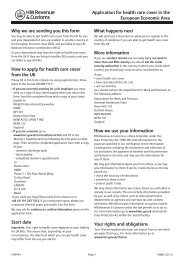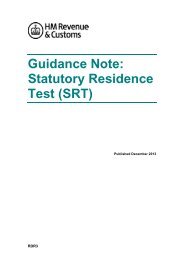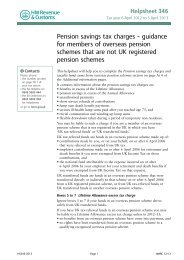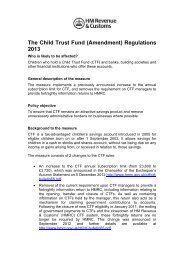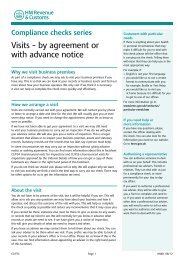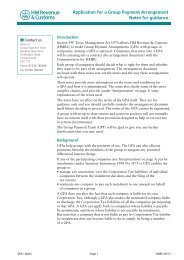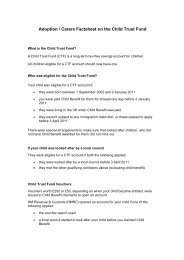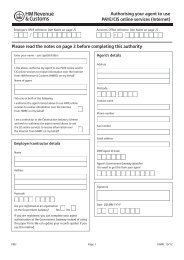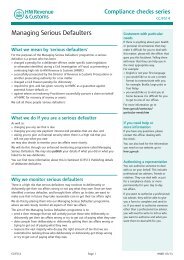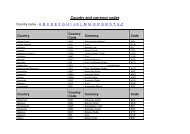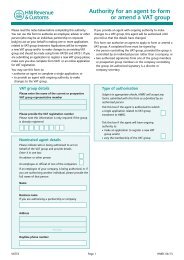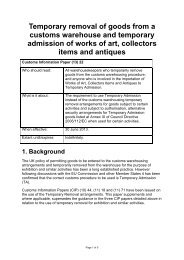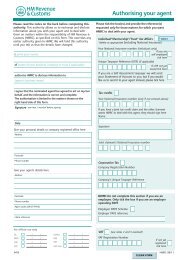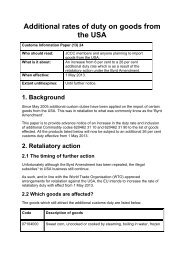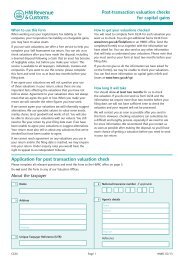IHT400 Notes : Guide to completing your Inheritance Tax account
IHT400 Notes : Guide to completing your Inheritance Tax account
IHT400 Notes : Guide to completing your Inheritance Tax account
You also want an ePaper? Increase the reach of your titles
YUMPU automatically turns print PDFs into web optimized ePapers that Google loves.
<strong>IHT400</strong> <strong>Notes</strong><br />
The other joint owner is<br />
a spouse or civil partner<br />
<strong>Guide</strong> <strong>to</strong> <strong>completing</strong> <strong>your</strong> <strong>Inheritance</strong> <strong>Tax</strong> <strong>account</strong><br />
However, in the case of a house or land, the open market value of a share is<br />
likely <strong>to</strong> be less than a share calculated in this way, as a discount may be<br />
appropriate. The amount of the discount will vary depending on the<br />
circumstances of each property and whether English or Scottish law applies.<br />
English law – To give us a starting point, you may reduce the arithmetical<br />
share of the value of the whole of the property by 10%. This will give us an<br />
indication of the value of the share of the property. This figure of 10% is<br />
only <strong>to</strong> give us a starting point. The amount of the discount, as well as the<br />
value estimated for the whole of the property, may need <strong>to</strong> be changed<br />
after the grant has been issued.<br />
Example<br />
The deceased owned a house worth £120,000 jointly with one other<br />
person. The arithmetical value of the deceased's share is £60,000 and this<br />
may be reduced by 10% (or £6,000). The value <strong>to</strong> include is £54,000.<br />
Scottish law – Under Scottish law a joint owner has a right <strong>to</strong> raise an<br />
action for division and sale. A discount for joint ownership will reflect the<br />
cost and possible delay of raising such an action. The cost is not related <strong>to</strong><br />
the value of the property, so cannot be calculated in percentage terms.<br />
As a starting point you may deduct £4,000 from the value of the whole<br />
property before calculating the arithmetical value of the deceased's share<br />
as the value <strong>to</strong> be included in the <strong>account</strong>. This is only a starting point.<br />
The value estimated may need <strong>to</strong> be changed after you get confirmation.<br />
Whether English or Scottish law applies you must not apply any discount if<br />
the other joint owner is the deceased's spouse or civil partner. Special rules<br />
prevent this discount from applying, so you should include the deceased's<br />
arithmetical share of the whole value of the house or land.<br />
We will usually ask the Valuation Office Agency <strong>to</strong> give us their opinion of<br />
the value of the deceased's property. They will take in<strong>to</strong> <strong>account</strong> the<br />
circumstances of any jointly owned property and amount of discount <strong>to</strong> be<br />
allowed. If the Valuation Office Agency cannot accept the figures you have<br />
used, they will try <strong>to</strong> agree a value with you. If the agreed value is more<br />
than the figure that you have suggested, you may have <strong>to</strong> pay some more<br />
tax (and interest).<br />
25



